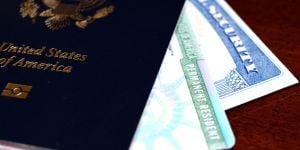Federal law guarantees Americans living overseas the right to vote in federal elections, no matter where they live or for how long. This is unlike the UK, for example, where the right to vote “expires” after 15 years abroad.
But that doesn't mean it's easy.
In fact, voting procedures are regulated by the individual states and the ease with which you can participate depends on the state you come from and the quality of the postal service where you live. On top of the sheer confusion factor, the biggest hurdle to overseas Americans getting their votes counted is the ballot arriving late or not at all. Sometimes this is the fault of state officials, sometimes it just can't be helped. But the result is, too often, votes that could count, don't.
Think it doesn't matter? There are 6 million + potential American voters living overseas. Vote for vote, we outweigh all but the 17 most populous states. We can, and we have, changed election outcomes.
I represent Overseas Vote Foundation, a nonpartisan nonprofit that has stepped in to try and help fix this problem. Our site makes it (relatively) simple to know how and when to vote without ever trying to tell you for whom you should vote. If you visit our site, our tools walk you through the entire process; we provide: the forms, all deadlines and rules, a complete list of contact information for local election officials in every state, links to nonpartisan candidate information and our deal with FedEx even provides low-cost express mail services for ballot returns in a long list of countries. If you sign up for our mailing list, we'll even send you a reminder of your deadlines.
Regardless of which tool or website you use, here are the key things you need to know:
- You vote in the state where you last lived. It doesn't matter where you were born or whether or not you ever intend to go back to that address. You cannot legally change this unless you move back to the States.
-
There are three parts to the process: registering to vote absentee and/or requesting a ballot (they are the same form but not the same deadlines!) and submitting your voted ballot. The third part? This is when your ballot doesn't show up on time. The Federal Write-in Absentee Ballot (FWAB) is the 'emergency' ballot. We recommend it if the regular ballot has not arrived by ten days prior to the election. (In most states, you have to be registered though!) If you use our online tools, we'll even fill in the candidates' names for you. Print it, vote and mail and you're done.
-
You need to allot at least 45-days for the ballot 'round-trip'. That is, the amount of time between the ballot being sent to you by the local election office and you sending it back. Too complicated? Here's the rule of thumb: request the ballot as soon as you think about and send it back as soon as you can.
-
Know all this already? Good for you! But you should also know that recently enacted federal legislation, the MOVE Act, means that several states are moving their primary dates to accommodate overseas and military voters and the new law means all overseas voters must re-register every election year.
-
Last point: if your children have been born and raised overseas, they may ' or may not ' be able to vote when they turn 18. Eighteen states allow them to vote at an American parents' address; the 32 others do not. It doesn't matter if they have legal citizenship; yes, they are supposed to file taxes every year and your sons are supposed to sign up for Selective Service, but their right to vote is not guaranteed.
Interested in this last topic? Come over to Youth Vote Overseas where we provide voting services to, and champion voting rights for, young Americans living overseas.
Clair Whitmer is also an Expat.comger. Find her Francey Pants site on this network. Her blog postings on overseas voting led directly to her current job as Director of Outreach at Overseas Vote Foundation.
We do our best to provide accurate and up to date information. However, if you have noticed any inaccuracies in this article, please let us know in the comments section below.











